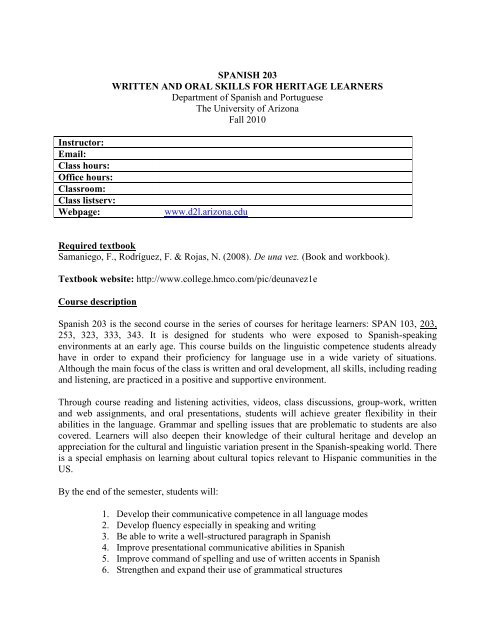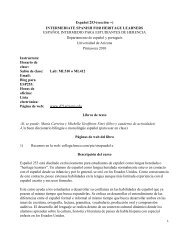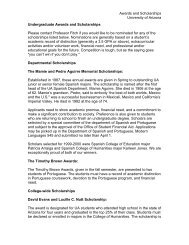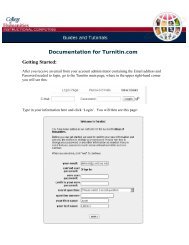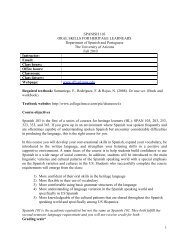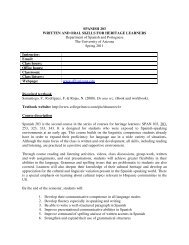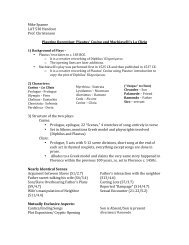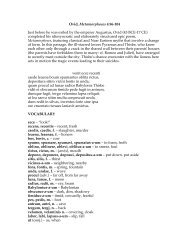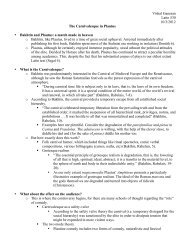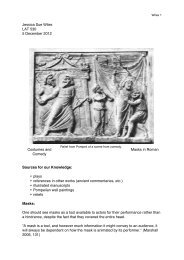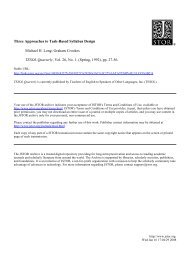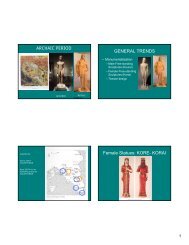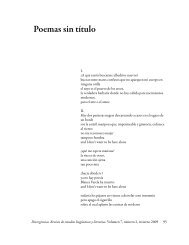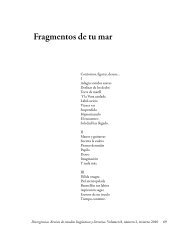SPANISH 203 WRITTEN AND ORAL SKILLS FOR HERITAGE ...
SPANISH 203 WRITTEN AND ORAL SKILLS FOR HERITAGE ...
SPANISH 203 WRITTEN AND ORAL SKILLS FOR HERITAGE ...
You also want an ePaper? Increase the reach of your titles
YUMPU automatically turns print PDFs into web optimized ePapers that Google loves.
<strong>SPANISH</strong> <strong>203</strong><br />
<strong>WRITTEN</strong> <strong>AND</strong> <strong>ORAL</strong> <strong>SKILLS</strong> <strong>FOR</strong> <strong>HERITAGE</strong> LEARNERS<br />
Department of Spanish and Portuguese<br />
The University of Arizona<br />
Fall 2010<br />
Instructor:<br />
Email:<br />
Class hours:<br />
Office hours:<br />
Classroom:<br />
Class listserv:<br />
Webpage:<br />
www.d2l.arizona.edu<br />
Required textbook<br />
Samaniego, F., Rodríguez, F. & Rojas, N. (2008). De una vez. (Book and workbook).<br />
Textbook website: http://www.college.hmco.com/pic/deunavez1e<br />
Course description<br />
Spanish <strong>203</strong> is the second course in the series of courses for heritage learners: SPAN 103, <strong>203</strong>,<br />
253, 323, 333, 343. It is designed for students who were exposed to Spanish-speaking<br />
environments at an early age. This course builds on the linguistic competence students already<br />
have in order to expand their proficiency for language use in a wide variety of situations.<br />
Although the main focus of the class is written and oral development, all skills, including reading<br />
and listening, are practiced in a positive and supportive environment.<br />
Through course reading and listening activities, videos, class discussions, group-work, written<br />
and web assignments, and oral presentations, students will achieve greater flexibility in their<br />
abilities in the language. Grammar and spelling issues that are problematic to students are also<br />
covered. Learners will also deepen their knowledge of their cultural heritage and develop an<br />
appreciation for the cultural and linguistic variation present in the Spanish-speaking world. There<br />
is a special emphasis on learning about cultural topics relevant to Hispanic communities in the<br />
US.<br />
By the end of the semester, students will:<br />
1. Develop their communicative competence in all language modes<br />
2. Develop fluency especially in speaking and writing<br />
3. Be able to write a well-structured paragraph in Spanish<br />
4. Improve presentational communicative abilities in Spanish<br />
5. Improve command of spelling and use of written accents in Spanish<br />
6. Strengthen and expand their use of grammatical structures
7. Expand their lexical repertoire in Spanish<br />
8. Understand the nature and extent of language and culture variation in the Spanishspeaking<br />
world<br />
9. Gain knowledge about their cultural heritage<br />
10. Appreciate the cultural differences among Spanish speakers in Latin America and<br />
in the United States<br />
Spanish <strong>203</strong> is the academic equivalent but not the same as Spanish 202. They both fulfill the<br />
fourth-semester language requirement and you will not receive credit for both.<br />
Course policies<br />
Emphasis will be on learning Spanish for real world purposes. You and your instructor will<br />
speak Spanish 100% of the time. There will be pair-work, group activities and whole-class<br />
discussions in which you are expected to actively participate and to use only Spanish. You are<br />
expected to use the grammatical concepts and vocabulary focused on in this class and in previous<br />
classes. You are also expected to learn the cultural information covered in the course. You<br />
should be prepared for each class and have completed your homework assignments before you<br />
come to class.<br />
Attendance and absence policies<br />
Students should arrive on time. Three late arrivals or early departures by more than 5 minutes<br />
will equal one unexcused absence. Attendance is mandatory. With the exception of days<br />
scheduled for tests, quizzes, and compositions, you may miss five (5) classes for any reason,<br />
personal, medical, etc. The sixth (6 th ) absence and every subsequent absence after that will<br />
occasion the loss of two percentage points off the FINAL OVERALL COURSE GRADE. After<br />
a total of TEN absences, your instructor will refuse your admittance to the class and choose to<br />
administratively drop you. If you fail to attend the first two days of class without notice, you will<br />
automatically receive a ‘withdraw’. If you stop attending class, it is your responsibility to drop<br />
the class and inform your instructor. All holidays or special events observed by organized<br />
religions will be honored for those students who show affiliation with that particular religion. In<br />
addition, absences pre-approved by the UA Dean of Students (or Dean’s designee) will be<br />
honored.<br />
Grading Scale*<br />
A= 92-100 B= 80-91 C=70-79 D= 60-69 F= 59 or less<br />
*You will receive periodic updates of your grade in the class through the D2L website. Please<br />
meet with your instructor frequently to discuss your progress in the course.
Grading Components:<br />
Classroom Participation 10%<br />
Classroom Presentations (2) 10%<br />
-Group presentation 5%<br />
-Individual presentation 5%<br />
Homework & quizzes 15%<br />
Online Chats (5) 10%<br />
Portfolio 25%<br />
-Compositions (3)<br />
5% each (15% total)<br />
-Community<br />
1% each (5% total)<br />
project and progress reflections (5)<br />
-Vocabulary and spelling entries<br />
.5% each (5% total)<br />
Mid-Term Exams (I and II) 15%<br />
Final Exam 15%<br />
Classroom Participation<br />
Students must complete all assignments and be prepared for class. Daily participation grades are<br />
awarded for individual oral participation in class discussions and in group work. Lack of<br />
preparation and/or participation or for any absence results in a grade of zero (0). Classroom<br />
participation will reflect individual preparation, classroom cooperation during group activities,<br />
and respect for the class and the instructor. Visiting the instructor during office hours will<br />
contribute to your participation grade. You can consult your doubts, questions, problems, grades,<br />
or simply go to talk and practice your Spanish. Any student who arrives late or leaves early will<br />
lose valuable participation points.<br />
In order to take full advantage of your language learning experience, you are expected to use<br />
Spanish outside the classroom as frequently as possible. Please find out about local events, club<br />
meetings (Club latino de Arizona), volunteering opportunities, CESL programs, online<br />
opportunities, SHL program events, etc.<br />
Computer lab use<br />
The class will be held in the computer lab, ML510 or ML412 once a week (please check the<br />
class schedule or check the D2L site for announcements). Class conduct should be followed in<br />
the lab. Visiting websites or engaging in activities not related to class is not allowed. Any student<br />
not adhering to computer lab use rules will be asked to leave and lose participation points for the<br />
day.<br />
The portfolio is a collection of different pieces of work done in this class with the purpose of<br />
documenting your progress in Spanish. It should be started the first day of class and will<br />
continue to grow as the semester progresses. Your teacher will ask you to bring the portfolio to<br />
class often so have it ready at all times. It will have 3 sections: 1) reflections on community<br />
projects, 2) vocabulary and spelling entries, 3) 3 compositions.
Reflections on community projects: When announced in the syllabus, you will have to write<br />
about your experiences regarding a community project assigned by your instructor. The topics<br />
are the following:<br />
1. Hispanic music (project can be presented at Fall interaction event)<br />
2. Local traditions, legends, and/or oral histories of elderly members of the HL community:<br />
interviews or surveys<br />
3. Hispanic foods<br />
4. Volunteer Service (Club Latino de AZ, local organizations)<br />
5. My progress in this class<br />
Vocabulary/spelling entries: This gives you an opportunity to record all new words and new<br />
spellings that you discover. Each entry should contain a minimum of 5 words and 5 new<br />
spellings. Each word should appear with a definition and an example of your own.<br />
Compositions: Students will write three essays, typed and double-spaced using 12-point Times<br />
Roman justified font. The topics will cover different aspects of the Hispanic cultures and<br />
traditions. All essays will require parts to be written at home and parts to be done in class and in<br />
groups so as to engage in a collaborative construction of the texts. Up to 10 points will be added<br />
to revised papers submitted within one week after the graded writing is returned to the student.<br />
The length varies depending on the composition so make sure to ask your instructor.<br />
Remember!: During the semester, the instructor will frequently ask you for the portfolio with or<br />
without notice so have it ready.<br />
Classroom Presentations<br />
Students will prepare and participate in two presentations about different aspects of the class,<br />
each evaluated for comprehensibility, vocabulary, content, accuracy, and creativity. The first<br />
group presentations consist of 6-8 minute interactive presentations in groups of 2-3 about a<br />
Hispanic country of your choice. Individual 6-minute presentations will take place at the end of<br />
the semester about the topic of a composition or reflection.<br />
Online discussions<br />
Out of class, students will participate in five chat exchanges in Spanish. You will have the<br />
opportunity to get to know other students and discuss interesting and controversial topics with<br />
them. More specific instructions will be provided in class.<br />
Spanish/English language use log<br />
Three times during the semester students will have to record how much Spanish and English they<br />
use during one entire day. They will write down the topic, the context, the language, the time,<br />
and the interlocutors. Students will hand in the log together with a reflection on the use of these<br />
two languages and how to achieve a good balance of use between the two. This will count as part<br />
of your daily homework.
Exams<br />
There will be 2 exams during the semester. Exam 1 will cover the material covered between<br />
weeks 1 and 5, exam 2 will cover weeks 6 through 12. Make-up exams cannot be administered<br />
without a documented excuse of an emergency. Students should contact the instructor before the<br />
date of the exam in case of a time conflict. The exam, however, takes top priority so you will<br />
need to cancel any appointment scheduled for the days of the exams. If an emergency happens<br />
the day of the exam, you need to contact the instructor or, if unavailable, the department<br />
immediately to make the necessary arrangements before the next class period. Make-up exams<br />
cannot be administered after two days of their initial scheduled date.<br />
Final Exam<br />
The final exam is comprehensive. Students who do not take the final exam on the scheduled date<br />
and time will receive a grade of zero. The Program Director must approve an alternate final<br />
exam in case of a medical emergency. No other excuses will be considered.<br />
Homework<br />
The instructor will assign a homework assignment for every class. This can consist of a reading<br />
or writing assignment, a grammar exercise, a web activity, and/or a language use activity such as<br />
participation in chats, club meetings, CESL programs, interviews, etc. No late homework will be<br />
accepted unless the student provides a documented excuse. Depending on the circumstances, you<br />
may occasionally be allowed to hand in your homework up to one day late but will lose 50% of<br />
the grade for the assignment. If you are absent when an assignment is due, you are still<br />
responsible for the assignment and can submit it online or through email. If you have restricted<br />
web access, please discuss your situation with your instructor and arrange for a friend to drop in<br />
the homework for you.<br />
Quizzes<br />
All (un)announced quizzes will be based on the topics taught the day before and the homework<br />
due that day. Come to class prepared and on time! No quiz may be made up for any reason.<br />
Tutoring<br />
The SHL program offers limited tutoring hours for the students in the program. A tutor can help<br />
you with all your doubts about different aspects of the Spanish language including grammar,<br />
vocabulary, and orthography. They can also help you practice your oral and written skills. Ask<br />
your instructor or program director at the beginning of the semester for available hours.
Disruptive behavior<br />
Unless you discuss an emergency situation with your instructor in advance, NO CELL PHONES,<br />
pagers or other electronic communication devices such as laptops or agendas are to be on or used<br />
during class. They are entirely prohibited during exams. Other disrupting behavior such as<br />
reading the newspaper, conversing while somebody is talking, leaving the classroom during<br />
class, etc, will not be allowed.<br />
Code of Academic Integrity<br />
The instructor and the Program Director will initiate an academic integrity case against students<br />
suspected of cheating, plagiarizing, or aiding others in dishonest academic behavior. Students are<br />
responsible for reading and understanding the Code of Academic Integrity, please refer to:<br />
http://studpubs.web.arizona.edu/policies/cacaint.htm. Examples of academic dishonesty include,<br />
but are not limited to, plagiarism, cheating, and aiding and abetting dishonesty. If the instructor<br />
suspects that a Code of Academic Violation has occurred, she/he in accordance with the Program<br />
Director shall impose any one of the following or a combination of the following sanctions: (1)<br />
Loss of credit for work involved, (2) Reduction in grade for the entire course, (3) Failing grade,<br />
(4) Disciplinary probation. For policies against threatening behavior by students, please visit:<br />
http://policy.web.arizona.edu/~policy/threaten.shtml.<br />
Disability<br />
Those students who are registered with the Disability Resource Center must submit appropriate<br />
documentation to the instructor if they are requesting reasonable accommodations. Please refer<br />
to: http://drc.arizona.edu/teach/syllabus-statement.html<br />
The information contained in this course syllabus, except for grades and course policies, may be<br />
subject to change with reasonable advance notice, as deemed appropriate by the instructor. The<br />
syllabus below is an approximate description of the course content; however, modifications to it<br />
depend largely on students’ interests and their background knowledge. You are a valuable<br />
resource to the classroom and it is expected that you will greatly contribute to class activities<br />
through introduction of topics that are relevant for you as a heritage learner and as a member of a<br />
Spanish-speaking community.<br />
Horario tentativo<br />
Fechas Capítulos Temas Gramática Ortografía Actividades<br />
Semana<br />
1<br />
(8-23/8-<br />
27)<br />
- Capítulo:<br />
¿Qué significa<br />
ser hispano?<br />
(Entre<br />
Mundos)<br />
-Repaso: 1)<br />
Presente del<br />
indicativo:<br />
Formas y usos<br />
2) ‘ser’ y<br />
‘estar’<br />
-Introducción a<br />
la clase y los<br />
estudiantes<br />
-Programa del<br />
curso<br />
-Cómo tener<br />
éxito en esta<br />
clase:<br />
Sugerencias<br />
-Nuestros<br />
valores<br />
-Nuestra cultura<br />
Actividad:<br />
-Escrito de diagnóstico<br />
en clase (notas de<br />
clase)<br />
-Entrevista de<br />
diagnóstico oral con el<br />
instructor en horas de<br />
oficina<br />
-Mi biografía<br />
lingüística y cultural
Semana<br />
2<br />
(8-30/9-<br />
3)<br />
Semana<br />
3<br />
(9-8/9-<br />
10)<br />
9-6:<br />
Labor<br />
day no<br />
classes<br />
Semana<br />
4<br />
(9-13/9-<br />
17)<br />
Semana<br />
5<br />
(9-20/9-<br />
24)<br />
Semana<br />
6<br />
(9-27/10-<br />
1)<br />
- Capítulo:<br />
¡En español,<br />
por favor!<br />
(Conozcámono<br />
s)<br />
- Capítulo: Mi<br />
familia<br />
(Conozcámono<br />
s)<br />
-Entre Mundos<br />
(p. 30, 31, 32 y<br />
33)<br />
- Capítulo: Mi<br />
familia<br />
(Conozcámonos)<br />
- Capítulo: Mi<br />
familia<br />
(Conozcámonos)<br />
-De una vez<br />
(capítulo 7):<br />
Españoles- La<br />
diversidad<br />
-Mi lengua y mi<br />
identidad: el<br />
español<br />
-Diferencias<br />
entre registros<br />
(informal/formal;<br />
oral y escrito):<br />
Características<br />
-La importancia<br />
del español y el<br />
inglés<br />
-Los países de<br />
habla hispana<br />
-Diferencias<br />
entre registros<br />
(informal/formal;<br />
oral y escrito):<br />
Características<br />
-Técnicas para<br />
estudiar y<br />
practicar el<br />
español en<br />
preparación para<br />
el examen I<br />
-Tradiciones<br />
diferentes<br />
-Repaso: 1)<br />
Presente del<br />
indicativo:<br />
Formas y usos<br />
2) El género<br />
- Repaso: 1)<br />
Pretérito:<br />
Verbos<br />
regulares,<br />
irregulares y<br />
con cambio de<br />
raíz<br />
- Repaso:<br />
Pretérito e<br />
imperfecto:<br />
Formas y usos<br />
-Repaso:<br />
Concordancia<br />
entre género y<br />
número<br />
(continuación)<br />
-El presente<br />
perfecto<br />
-Diferencias<br />
entre el<br />
alfabeto inglés<br />
y el español:<br />
letras<br />
problemáticas<br />
(reflexión) y<br />
deletreos<br />
diferentes<br />
-La sílaba<br />
tónica:<br />
Agudas,<br />
graves y<br />
esdrújulas<br />
-Introducción<br />
a la sílaba<br />
tónica:<br />
Práctica con<br />
las palabras<br />
agudas<br />
-‘ha’ y ‘a’<br />
-Entrevista diagnóstica<br />
con el instructor en<br />
horas de oficina<br />
-Actividad de audiocomprensión<br />
1: Mi<br />
variedad<br />
-Reflexión 1 (Estilo<br />
informal)<br />
-Actividad de audiocomprensión<br />
2: Estilos<br />
informales<br />
-Reflexión 2 (Estilo<br />
informal)<br />
Actividad:<br />
-Spanish/English<br />
language use log<br />
-Actividad de audiocomprensión<br />
3: Las<br />
noticias (Ejemplo de<br />
estilo formal)<br />
-Composición 1<br />
(Preparación: p. 261-<br />
262) (Estilo formal)<br />
-Repaso para el<br />
examen: Guía<br />
-Actividad de audiocomprensión<br />
4: La<br />
telenovela<br />
-Intercambio en el chat<br />
I<br />
-Composición I:<br />
Entrega y trabajo de<br />
edición en clase<br />
-Repaso para el<br />
examen: Guía<br />
Examen 1<br />
Semana<br />
7<br />
(10-4/10-<br />
8)<br />
-De una vez<br />
(capítulo 10):<br />
Perú<br />
-Las tradiciones<br />
y la diversidad<br />
lingüística<br />
-El futuro<br />
-La sílaba<br />
tónica:<br />
práctica con<br />
las palabras<br />
graves<br />
-Intercambio en el chat<br />
II<br />
-Película:<br />
Quinceañera (en D2L)<br />
-Reflexión 3<br />
Semana<br />
8<br />
(10-<br />
11/10-15)<br />
-De una vez<br />
(capítulo 10):<br />
Perú<br />
-Las<br />
comunidades<br />
indígenas<br />
-Los derechos de<br />
las minorías<br />
-El condicional<br />
-La sílaba<br />
tónica:<br />
práctica con<br />
las palabras<br />
esdrújulas<br />
-Actividad de audiocomprensión<br />
5<br />
-Composición 2:<br />
Preparación (p. 378-<br />
379)
-La ‘c’, ‘s, ‘z’<br />
Semana<br />
9<br />
(10-<br />
18/10-22)<br />
Semana<br />
10<br />
(10-<br />
25/10-29)<br />
Semana<br />
11<br />
(11-1/11-<br />
5)<br />
Presentaciones grupales orales -El subjuntivo -Las reglas de<br />
la tilde<br />
-De una vez (capítulo 8): México<br />
-La historia sociopolítica de los<br />
mexicano-americanos<br />
-Personalidades transcendentes<br />
-De una vez<br />
(capítulo 8):<br />
México<br />
Recursos en la<br />
comunidad y la<br />
web<br />
-Composición 2:<br />
Entrega y trabajo de<br />
edición en clase<br />
Actividad:<br />
-Spanish/English<br />
language use log<br />
-Encuesta sobre tu<br />
opinión sobre la clase<br />
-Intercambio en el chat<br />
III<br />
-El subjuntivo -La ‘b’ y ‘v’ Actividad:<br />
-Spanish/English<br />
language use log<br />
-El subjuntivo<br />
-Las reglas de<br />
la tilde:<br />
Repaso<br />
-Repaso para el<br />
examen: Guía de<br />
repaso<br />
-Intercambio en el chat<br />
IV<br />
Semana<br />
12<br />
(11-8/11-<br />
12)<br />
Semana<br />
13<br />
(11-<br />
15/11-19)<br />
-De una vez<br />
(capítulo 9):<br />
Guatemala-<br />
-De una vez<br />
(capítulo 9):<br />
Guatemala<br />
Recursos en la<br />
comunidad y la<br />
web<br />
-Lenguas en<br />
contacto<br />
-Las variedades<br />
regionales<br />
-El voseo (p.<br />
209)<br />
-El subjuntivo -Examen # 2<br />
-Intercambio en el chat<br />
9<br />
-El subjuntivo<br />
Verbos ‘hacer’<br />
y ‘ser’<br />
-Reflexión 4<br />
-Intercambio en el chat<br />
V<br />
Semana<br />
14<br />
(11-<br />
22/11-24)<br />
-De una vez<br />
(capítulo 12):<br />
Argentina<br />
-El bilingüismo<br />
-Recursos en la<br />
comunidad y la<br />
web<br />
-Composición 3<br />
(Preparación: p. 454-<br />
455-456)<br />
11-25:<br />
Thanks<br />
Giving<br />
no<br />
classes<br />
Semana<br />
15<br />
(11-<br />
29/12-3)<br />
-De una vez<br />
(capítulo 12):<br />
Argentina<br />
-El bilingüismo<br />
-Recursos en la<br />
comunidad y la<br />
web<br />
-Las variedades<br />
regionales<br />
-Tema<br />
gramatical<br />
problemático<br />
para los<br />
alumnos<br />
-Tema<br />
ortográfico<br />
problemático<br />
para los<br />
alumnos<br />
-Composición 3:<br />
Entrega y trabajo de<br />
edición en clase<br />
-Encuesta sobre la<br />
clase y el programa<br />
para estudiantes de<br />
herencia<br />
-Prueba de logros<br />
-Repaso para el<br />
examen final: Guía de<br />
repaso
Semana<br />
16<br />
(12-6/12-<br />
8)<br />
12-8:<br />
Last Day<br />
of classes<br />
Presentaciones orales<br />
Final exam: The date of the exam is based on the day and time of class.<br />
http://registrar.arizona.edu/schedule104/exams/104exams.htm (No<br />
changes can be made to the official exam schedule)<br />
-Actividad:<br />
Spanish/English<br />
language use log<br />
-Entrega del<br />
portafolio con la<br />
reflexión 5<br />
*Recuerda formar parte del Club de Heritage Learners: ‘Club latino de Arizona’. Para más<br />
información, comunícate con la Profesora Sara Beaudrie (beaudrie@email.arizona.edu) o visita<br />
nuestra página de web en http://w3.coh.arizona.edu/spanish/heritage/under_heritage.cfm.<br />
*****************************************


